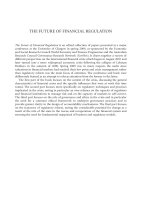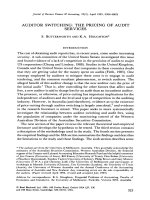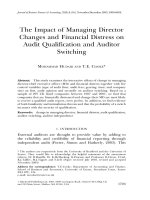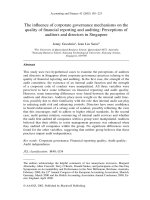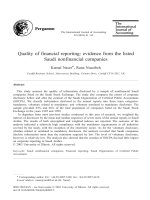The Future of Financial Services How disruptive innovations are reshaping the way financial services are structured, provisioned and consumed
Bạn đang xem bản rút gọn của tài liệu. Xem và tải ngay bản đầy đủ của tài liệu tại đây (4.92 MB, 178 trang )
The Future of Financial Services
How disruptive innovations are reshaping the way financial
services are structured, provisioned and consumed
An Industry Project of the Financial Services Community | Prepared in collaboration with Deloitte
Final Report ● June 2015
Foreword
Consistent with the World Economic Forum’s mission of applying a multi-stakeholder approach
to address issues of global impact, the creation of this report involved extensive outreach and
dialogue with the financial services community, innovation community, academia and a large
number of financial technology startups. The dialogue included numerous interviews and
interactive sessions to discuss the insights and opportunities for collaborative action.
Sincere thanks are extended to the industry experts and emerging disruptors who contributed
their unique insights to this report. In particular, the members of the Project’s Steering
Committee and Working Group, who are introduced in the following pages, played an invaluable
role as experts and patient mentors.
We are also very grateful for the generous commitment and support to Deloitte Consulting LLP
in the U.S., an entity within the Deloitte1 network, in its capacity as the official professional
services advisor to the World Economic Forum for this project.
Contact
For feedback or questions,
please contact:
R. Jesse McWaters
+1 (212) 703-6633
Deloitte refers to one or more of Deloitte Touche Tohmatsu Limited, a UK private company limited by guarantee (“DTTL”), its network of member
firms, and their related entities. DTTL and each of its member firms are legally separate and independent entities. DTTL (also referred to as
“Deloitte Global”) does not provide services to clients. Please see www.deloitte.com/about for a more detailed description of DTTL and its
member firms.
1
This report contains general information only, and none of Deloitte Touche Tohmatsu Limited, its member firms, or their related entities
(collectively, the “Deloitte network”) is, by means of this report, rendering professional advice or services. No entity in the Deloitte network shall be
responsible for any loss whatsoever sustained by any person who relies on this report.
1
Table of Contents
Acknowledgements…………………………………………………………….………………………………………………………………………………………………..……………
4
Executive Summary…………………………………………………………………………………………………………………………………………………………………………..… 10
Reading Guide…………………………………………………………………………………………………………………………………………………………………………………..… 24
Detailed Research Modules………………………………………………………………………………………………………………………………………………………………... 27
Payments:
How will customer needs and behaviours change in an increasingly cashless payments landscape?.......................................................................................... 28
How will the evolution of decentralised or non-traditional payment schemes change the role of traditional financial institutions? ………………………………..…… 43
Insurance:
How will disaggregating forces across the value chain transform the insurance industry? ........................................................................................................ 58
How will an ever more connected world impact the value delivered by insurance providers? .................................................................................................... 72
Deposits and Lending:
How will emerging alternative models of lending change the market dynamics of traditional lenders? .................................................................................... 86
What will be the future role of financial institutions in response to continually shifting customer preferences? ....................................................................... 100
Capital Raising:
How will the evolution of distributed capital raising impact the role of traditional intermediaries? .......................................................................................... 112
Investment Management:
How will the empowerment of individuals through automated systems and social networks transform the business of investment management?............... 127
How will the externalisation of key processes transform the financial ecosystem? .................................................................................................................... 139
Market Provisioning
How will smarter and faster machines transform capital markets? ............................................................................................................................................ 153
What impact will better connected buyers and sellers have on capital markets? ....................................................................................................................... 163
Contact Details................................................................................. .......................................................................................................... 178
2
Acknowledgements
3
Acknowledgements
Members of the Steering Group
The following senior leaders of global financial institutions have provided guidance, oversight and thought leadership to the “Disruptive Innovation in Financial Services”
project as its Steering Group:
Oliver Bussman
John Flint
Joanna Rotenberg
Chief Information Officer,
UBS
Chief Executive Officer, Retail Banking
and Wealth Management,
HSBC
Chief Marketing Officer and Head of
Strategy, BMO Financial Group
Ann Cairns
Jason Harris
Neeraj Sahai
President, International Markets,
MasterCard
Chief Executive Officer, International
Property and Casualty, XL Group
President,
Standard & Poor’s
David Craig
Michael Harte
William Sheedy
President, Financial and Risk,
Thomson Reuters
Chief Technology Officer,
Barclays
Global Executive, Corporate Strategy,
M&A, Government Relations, Visa
Fred Crawford
Rob Heyvaert
Lance Uggla
Chief Executive Officer,
Alix Partners
Corporate Executive Vice President,
FIS
Chief Executive Officer,
Markit Group
Stephen Cross
David Puth
Dieter Wemmer
Chief Executive Officer, Aon GRIP
Solutions, Aon
Chief Executive Officer,
CLS Group
Member of the Board of Management,
Finance, Controlling, Risk (CFO),
Allianz SE
Anna Ewing
Henry Ritchotte
Executive Vice President, Global
Technology Solutions, NASDAQ
Chief Operating Officer,
Deutsche Bank
4
Acknowledgements
Members of the Working Group
The project team would also like to acknowledge the following executives of global financial institutions who helped define the project framework and shape strategic
analyses as its Working Group:
Rachel Bale
Robert Hedges
Nicolas de Skowronski
VP Mobile Converged Payments,
MasterCard Worldwide
Managing Director,
AlixPartners
Chief of Staff,
Bank Julius Baer
Tom Brown
Neil Mumm
John Smith
Partner,
Paul Hastings
VP Corporate Strategy,
Visa
IT Director, Group Head Office,
Prudential PLC
Francis Bouchard
Matthew Levin
Huw Van Steenis
Group Head of Government and Industry
Affairs, Zurich
EVP and Head of Global Strategy,
Aon
Head of Financial Services Research,
Morgan Stanley
Fabrizio Campelli
Victor Matarranz
Andrew Tarver
Head of Group Strategy,
Deutsche Bank
Director of Strategy & Chief of Staff to
the CEO, Santander
Head of UK Operations,
FIS / Capco
Ericson Chan
Max Neukirchen
Colin Teichholtz
Chief Information Officer Hong Kong and
Greater China, Standard Chartered
Head of Strategy,
JP Morgan Chase
Partner & Co-Head of Fixed Income
Trading, Pine River Capital
Robert Coppola
Christine O’Connell
Fabien Vandenreydt
Chief Technology Officer of S&P Capital
IQ and S&P Dow Jones, McGraw Hill
Global Head of Strategy & Business
Development, Thomson Reuters
Head of Markets Management, Innotribe
& the SWIFT Institute, SWIFT
Christof Edel
Kosta Peric
Derek White
Global Head of Trading Strategy &
Business Development, Thomson
Reuters
Deputy Director Financial Services for
the Poor, Bill and Melinda Gates
Foundation
Chief Design & Digital Officer,
Barclays
John Edge
Robert Palatnick
Chairman,
Digital Stored Value Association
Managing Director and Chief Technology
Architect, DTCC
Ignacio A. Goicoechea
Peter Rutland
Head of IT and Operations,
Banorte
Senior Managing Director,
CVC Capital Partners
Rob Galaski (Project Advisor)
Deloitte Canada
5
Acknowledgements
List of innovators and subject matter experts (1 / 2)
In addition, the project team expresses its gratitude to the following innovators and subject matter experts who contributed their valuable perspectives through interviews
and workshops (in alphabetical order):
Asheesh Advani
Jeremy Allaire
Giles Andrews
Radhika Angara
Yoni Assia
Jolyon Barker
Alex Batlin
Inga Beale
Nick Beecroft
Eric Benazeh
Sarah Biller
Stephen Bingle
Dave Birch
Josh Bottomley
Catherine Brown
Chris Brycki
Olaf Carlson Wee
Ulf Carlsson
Bhaskar Chakravorti
James Chappell
Gongpil Choi
Jonathan Coblentz
Claire Cockerton
Charlotte Cowell
Eugene Danilkis
Bruce Davis
Thomas Deluca
Marten Den Haring
Samir Desai
Maciej Dolinski
Matt Dooley
Paul Drake
Leigh Drogen
Aron Dutta
Grechen Effgen
John Fawcett
CEO, Covestor
Co-Founder & CEO, Circle
Co-Founder & CEO, Zopa
Chief Marketing Officer, Fastacash
CEO, eToro
Deloitte UK
Group CTO, Applied Innovation and Market Research, UBS
CEO, Lloyd’s
Emerging Risks and Research Manager, Lloyds of London
Director, International Development, Meniga
President, Capital Market Exchange
Business Development Asia, Smart Engine
Director, Consult Hyperion
Global Head of Digital, HSBC
Group Strategy Director, Lloyd’s
CEO, Stockspot
Head of Risk, Coinbase
General Manager, North Asia & Japan, Nasdaq
Senior Associate Dean, The Fletcher School of Law and Diplomacy,
Tufts University
CTO, Digital Shadows
Senior Advisor, Korea Institute of Finance
CFO, Progresso Financero
CEO / Founding Director, Innovate Finance
Head of Product, Wealth Management, MetLife
CEO, Mambu
Joint Managing Director, Abundance Generation
CEO, Advanced Merchant Payment
Chief Economist and Product Officer, Digital Reasoning Systems
Co-Founder & CEO, Funding Circle
CEO & Founder, Friendly Score
Managing Director, Connected Thinking Asia
Managing Director, Strategy & Business Development, Standard &
Poor’s
CEO, Estimize
Head of Strategy for Financial Markets, Cisco
Head of Business Development, Zipcar
CEO, Quantopian
Lin Feng
Clare Flynn Levy
CEO, Deal Globe
Founder & CEO, Essentia Analytics
Dave Girouard
Founder & CEO, Upstart
Colin Gleeson
Deloitte UK
Matthew Goldman
CEO, Wallaby
Russell Gould
Product Manager, Mobile Wallet Solutions, Vodafone
Ian Green
Co-Founder & CEO, eCo Financial
Julia Groves
Chair, UKFCA
Sarah Habberfield
Deutsche Bank
William Harris Jr.
CEO, Personal Capital
Jilliene Helman
CEO, Realty Mogul
Dylan Higgins
CEO, Kopo Kopo
Dorothy Hillenius
Director Group Strategy, ING
Reid Hoffman
Innnovator, Investor and Author
Brian Hong
Managing Director, Financial Services, CVC Capital Partners
Kaori Iida
Senior Editor, Economic News Division, NHK
Bert Jan Van Essen
Managng Director & Co-Founder, Dragon Wealth
Paul Jung
Sony Kapoor
Vice-President, Head of Emerging Products and Innovation, North Asia, Visa
Inc.
Managing Director, Re-Define
Brad Katsuyama
CEO, IEX
Tom Keene
Anchor & Editor-at-Large, Bloomberg
James Kennedy
CTO, Asia Pacific, UBS
Damian Kimmelman
David Kirkpatrick
CEO, DueDil
Founder & CEO, Techonomy
Andy Kooper
Founder & CEO, LeapfrogInvestments
Christian Lanng
CEO, Tradeshift
Francine Lacqua
Anchor & Editor-at-Large, Bloomberg
Renaud Laplanche
CEO, Lending Club
Chris Larsen
CEO, Ripple
Michael Laven
CEO, Currency Cloud
Gerard Lemos
Chairman, UK Payments Council
Max Levchin
Founder, Affirm
Michael Li
CEO, CTQuan
Sandra Linhan
CEO, Lark
Nektarios Liolios
Managing Director, Startupbootcamp Fintech
Ken Lo
Co-Founder & CEO, ANX
6
Acknowledgements
List of innovators and subject matter experts (2 / 2)
In addition, the project team expresses its gratitude to the following innovators and subject matter experts who contributed their valuable perspectives through interviews
and workshops (in alphabetical order):
Bo Lu
Jeff Lynn
John Macdonald
Kevin Mak
Paul Makin
Demetrios Marantis
Emmanuel Marot
Kevin Martin
Mike Massaro
Mike Mathias
Steve Mendel
Douglas Merrill
Liao Min
Rory Moloney
Daniel Nadler
Mas Nakachi
Mike Naughton
Christian Nentwich
Zhu Ning
Michael Nugent
Stephen Pair
Kyung Yang Park
Kitty Parry
Loren Pastore
Andy Patton
Leslie Payne
Sandy Peng
Anthony Pereira
Claudine Perlet
Jonas Piela
Basil Qunibi
Simon Redfern
Josh Reich
Selma Ribica
Christoph Rieche
Antonia Rofagha
CEO, Future Advisor
CEO, Seedrs
Director, Risk Analytics & Customer Solutions, IBM
Managing Director, IronFly Technologies
Head of Mobile Money, Consult Hyperion
Head, International Policy and Regulatory Affairs, Square
Co-Founder & President, Lending Robot
Head of Retail Banking and Wealth Management, Asia Pacific, HSBC
CEO, peerTransfer
Deloitte China
Co-Founder & CEO, Bought by Many
Founder & CEO, Zest Finance
Director-General, Shanghai Office, China Banking Regulatory
Commission
CEO, Aon Global Risk Consulting, Aon
CEO, Kensho
CEO, Open Gamma
Managing Director of Asia for Strategic Customers & Solutions,
Thomson Reuters
CEO, DuCo
Deputy Director and Professor of Finance, Shanghai Advanced
Institute of Finance
CEO, Bison
CEO, bitpay
CEO, UbiPay
CEO, Templars
Business Development Manager, UpSlide
VP, EMEA International Business Development, AMEX
Director of Public Affairs, Lendup
CEO, UCAN
Founder & CEO, Percentile
Head of COO Office, Allianz
Founder, Avuba
CEO, Novus
CEO, Open Bank Project
CEO, Simple
Principal Product Development Manager, Mobile Payments, Vodafone
Co-Founder & CEO, iwoca
Communications Manager, Transferwise
Yin Rong
Deputy Director, IT, Bank of China
Jeff Rosenberger
VP, Research & Customer Development, Wealthfront
Kevin Sara
Chairman, Batan Limited
Arjan Schutte
Managing Partner, Core Innovation Capital
Vasuki Shastry
Group Head of Public Affairs, Standard Chartered
Hyunwook Shin
CEO, Popfunding
Barry Shrier
Founder & CEO, Liquity
Barry Silbert
Founder, Second Market
Brian Sin
Former Head of Innovation, Cigna
Gurjeet Singh
CEO, Ayasdi
Balvinder Singh
CEO, TootPay
Siddarth Singh
Head of Programme, Pivotal Innovations
Maria Sit
Regional Managing Director, Asia, Health Wallace
Paul Sonderegger
Big Data Strategist, Oracle
Stan Stalnaker
CEO, Hub Culture
Jeff Stewart
CEO, Lenddo
Ron Suber
CEO, Prosper
Stu Talyor
Co-Founder & CEO, Algomi
Matin Tamizi
Co-Founder & CEO, Balanced Payments
Donald Tang
CEO, China, D.E. Shaw & Co. LP
Spiros Theodossiou
VP Product Strategy, Skrill
James Tickner
VP, Corporate Solutions, Nasdaq
Don Trotta
Global Head of Banking, SAP
Eric Van der Kleij
Head, Level39
Mark Wales
Deloitte China
Karen Webster
Managing Director, Market Platform Dynamics
Karsten Wenzlaff
Leader, German Crowdfunding Network
Darren Westlake
CEO, Crowdcube
Paul Wilkins
Chairman & CEO, Marsh (MMCo), Hong Kong SAR
Jeremy Wilson
Vice Chairman, Corporate Banking, Barclays
Andrew White
CEO, FundApps
Edan Yago
CEO, Epiphyte
Roger Ying
Co-Founder & CEO, Pandai
Joyce Zhang
VP, Oriental Patron
Giuseppe Zocco
Co-Founder, Index Ventures
7
Acknowledgements
Project Team and Additional Thanks
Project Team
Additional Thanks
The “Disruptive Innovation in Financial Services” project team includes the following
individuals
In addition, the project team expresses its gratitude to the following individuals for their
contribution and support throughout the project (in alphabetical order):
World Economic Forum Project Team
Mika Ciotola
Eva-Maria Thurnhofer
Giancarlo Bruno, Senior Director, Head of Financial Services Industry
Frank Oberholzner
Joerg Weydanz
Abel Lee, Director, Insurance and Asset Management Industry
Maja Schwob
Matthew Blake, Director, Banking and Capital Markets Industry
Jesse McWaters, Project Manager, Disruptive Innovation in Financial Services – Report Editor
Professional Services Support From Deloitte
Rob Galaski, Deloitte Canada
Market Color (Digital Production)
The Value Web (Event Facilitation)
Level 39 (Location Services)
Hwan Kim, Deloitte Canada
8
Executive Summary
9
The mandate of this project was to explore the transformative potential of new
entrants and innovations on business models in financial services
Project Context
We set out to address three major problems that have prevented a comprehensive understanding of the state of disruptive innovation in the industry:
There is no common taxonomy or understanding of which innovations are the most relevant
There is no clear understanding of the evolutionary path of emerging innovations
The implications of those evolutions on incumbent business models are unclear, creating significant uncertainty for traditional players as they strive to
react to growing competitive pressures
Project Approach
We structured our research around three main questions, each requiring distinct actions:
1
Which emerging innovations are the most impactful and relevant to the financial services industry?
Action: We identified 11 key clusters of innovations based on how they impact the core functions of financial services
2
How will these innovations impact the ways in which financial services are structured, provisioned and consumed in the future?
Action: We considered a range of scenarios for the degree and nature of impact each cluster of innovation could have
3
What would be the implications of these changes on customers, financial institutions, and the overall financial services industry?
Action: We analysed the implications of each scenario on customers, incumbent institutions and the overall financial services ecosystem
10
Over 15 months of research we engaged with industry leaders and innovators
through interviews and multi-stakeholder workshops
Innovators
Industry Leaders
Oversight, guidance and thought leadership from 16 C-suite executives
and 25 strategy officers of global financial institutions
In-person and phone interviews with 100+ innovative new entrants
and subject matter experts
Global Workshops
Facilitated six multi-stakeholder workshops at global financial hubs with 300+ total participants including
industry leaders, innovators, subject matter experts, and regulators
Hong Kong SAR
4 Sep. `14
Tianjin, China
11 Sep. `14
Boston, USA
30 Sep. `14
New York, USA
21-22 Oct. `14
London, UK
2 Dec. `14
Davos, Switzerland
21 Jan. `15
11
The outcome of this work is the first consolidated taxonomy for disruptive
innovation in financial services
Research Framework
We have structured our framework against six
functions of financial services and eleven clusters
of innovation.
Functions of Financial Services
Even in an environment of rapid change to the
design, delivery and providers of financial services,
the core needs those services fulfill remain the
same. We have identified six core functions that
comprise financial services :
Payments
Insurance
Market
Provisioning
Deposits &
Lending
Investment
Management
Capital
Raising
Clusters of Innovation
We have identified 11 clusters of innovation exerting
pressure on traditional business models
12
We have synthesised six high level insights on innovation in financial services
Key Research Findings
1
Innovation in financial services is deliberate and predictable; incumbent players are most likely to be attacked
where the greatest sources of customer friction meet the largest profit pools
2
Innovations are having the greatest impact where they employ business models that are platform based, data
intensive, and capital light
3
The most imminent effects of disruption will be felt in the banking sector; however, the greatest impact of disruption
is likely to be felt in the insurance sector
4
Incumbent institutions will employ parallel strategies; aggressively competing with new entrants while also
leveraging legacy assets to provide those same new entrants with infrastructure and access to services
5
Collaboration between regulators, incumbents and new entrants will be required to understand how new innovations
alter the risk profile of the industry – positively and negatively
6
Disruption will not be a one-time event, rather a continuous pressure to innovate that will shape customer
behaviours, business models, and the long-term structure of the financial services industry
13
In the following pages, we have summarised our insights by function and cluster
Insight Summary – Reading Guide
This section provides a summary of our findings, divided by function and clusters within the functions. For each cluster of innovation we have defined
the major disruptive trends, summarized the impact, and examined key implications for institutions in that function and cluster.
Function grouping
Innovation cluster
Key trends driving disruption in financial
services business model
Summary of the activity that the cluster
of innovation is creating
Major implications for financial institutions
as a result of activity within the cluster
14
Key Findings | Payments
Cashless World
Emerging Payment Rails
Key Disruptive Trends
Mobile
Payments
Streamlined
Payments
Key Disruptive Trends
Integrated
Billing
Next Generation
Security
Cryptographic
Protocols
P2P
Transfers
Mobile
Money
Summary
Summary
New consumer functionalities are being built on existing payment
systems and will result in meaningful changes in customer
behaviour
The greatest potential for cryptocurrencies may be to radically
streamline the transfer of value, rather than as store of value
Implications for Financial Institutions
Implications for Financial Institutions
Financial institutions may lose control over their customers’
transaction experience as payments become more integrated
As more efficient alternative rails are adopted, the role of traditional
intermediaries as a trusted party may diminish
With reduced visibility, becoming the default card among specific
customer segments will become critical
Financial institutions may face a new set of risks (e.g., reputation,
security) and regulatory issues as they participate in new rails
Winning issuers will be able to gain visibility into more of
customers’ spending patterns, build more holistic understanding
of customers, and create more competitive offerings
Applications of these technologies can expand beyond money
transfer to modernise other financial infrastructures
15
Key Findings | Insurance
Insurance Disaggregation
Connected Insurance
Key Disruptive Trends
Disaggregated
Distribution
Sharing
Economy
Key Disruptive Trends
Self-Driving
Cars
3rd Party
Capital
Smarter, cheaper
sensors
Wearables
Internet-of-Things
standardised
Platforms
Summary
Summary
Emergence of online insurance marketplaces and
homogenisation of risks will force big changes in insurers’
strategies
Ubiquity of connected devices will enable insurers to highly
personalise insurance and proactively manage clients’ risks
Implications for Financial Institutions
Implications for Financial Institutions
In an increasingly commoditised environment, the risks of
customers being more fickle will increase and creating loyalty
through innovation will become more important
As customer relationships evolve from short-term product-based to
long-term advisory, capturing customers early on becomes critical
Insurers’ ability to benchmark against competitors will become
more important as customers gain ability to comparison-shop
With increased margin pressure, insurers will need to increase
their size by expanding either scope or scale
As insurers become a hub for customer data, their strategic value
within full-service financial institutions will grow
Forming partnerships with data providers, device manufacturers and
other ecosystem participants will be critical to enable connected
insurance
16
Key Findings | Deposits & Lending
Alternative Lending
Shifting Customer Preferences
Key Disruptive Trends
P2P
Key Disruptive Trends
Lean, Automated
Processes
Alternative
Adjudication
Virtual Banking
2.0
Banking as Platform
(API)
Evolution of Mobile
Banking
Summary
Summary
New lending platforms are transforming credit evaluation and
loan origination as well as opening up consumer lending to nontraditional sources of capital
New entrants will make meeting customer demands more
important, creating an imperative for banks to reconsider their
roles
Implications for Financial Institutions
Implications for Financial Institutions
Intensified competition will narrow spread between deposits and
loans, decreasing financial institutions’ profitability
Financial products will increasingly be offered on a stand-alone basis
limiting incumbents’ ability to competitively cross-subsidise
As savers turn to alternative platforms, traditional deposits and
investment products will be eroded
Financial institutions’ ability to collaborate with non-traditional
players and other institutions will become essential
Distribution of customers’ credit portfolio over a large number of
alternative platforms may make it difficult to measure customer’s
creditworthiness
Financial institutions will need to choose where they will specialise
and where they will leverage external partners (e.g., product
manufacturing vs. creation of customer experience)
17
Key Findings | Capital Raising
Crowdfunding
Key Disruptive Trends
Empowered Angel
Investors
Alternative
Adjudication
Summary
Crowdfunding platforms are widening access to capital raising
activities, making the overall ecosystem richer
Implications for Financial Institutions
Access to more diverse funding options allow new companies to
grow at a quicker pace and shorten the average time between
early funding stages
Distribution platforms create a venue for investors to tailor their
investment portfolio across dimensions beyond financial return
As the barriers to enter the asset class fall, it becomes ever more
important for traditional intermediaries’ profitability to find
undiscovered “start” investments
18
Key Findings | Investment Management
Empowered Investors
Key Disruptive Trends
Social
Trading
Process Externalisation
Key Disruptive Trends
Automated Advice &
Wealth Management
Retail Algorithmic
Trading
Advanced
Analytics
Natural
Language
Process-as-aService
Capability
Sharing
Summary
Summary
Robo-advisors are improving accessibility to sophisticated
financial management and creating margin pressure, forcing
traditional advisors to evolve
The scope of externalisable processes is expanding, giving
financial institutions access to the new levels of efficiency and
sophistication
Implications for Financial Institutions
Implications for Financial Institutions
New entrants will place pressure on margins and intensify
competition among traditional players in more specialised
segments
The ability to access sophisticated capabilities without large
infrastructure investments flattens the playing field for mid-sized
institutions
As more advisory functions become automated, distributing
wealth products via proprietary advisory channels will become
less effective
Organisational agility will become critical to sustain competitiveness
as high-value capabilities are continued to be commoditised
As new entrants widen the access for mass customers, they will
compete for customers’ traditional savings deposits
Externalisation of capabilities may result in workforce skill loss by
preventing the development of a holistic view of operations
19
Key Findings | Market Provisioning
Smarter, Faster Machines
New Market Platforms
Key Disruptive Trends
Machine Accessible
Data
Key Disruptive Trends
Artificial Intelligence /
Machine Learning
Big
Data
Fixed Income
Funds / Fund
of Funds
Private Equity /
Venture Capital
Shares
Private
Company
Shares
Commodities &
Derivative
Contracts
Summary
Summary
As the popularity of high frequency trading declines, the focus of
algorithmic trading may shift to smarter, faster response to reallife events
New information platforms are improving connectivity among
market constituents, making the markets more liquid, accessible,
and efficient
Implications for Financial Institutions
Implications for Financial Institutions
The impacts of event-driven algorithmic trading on liquidity,
spread and systemic stability are unclear
As traditional differentiators among intermediaries (e.g., ability to
discover counterparty) become commoditised, the importance of
advisory services will increase
With end-to-end trading activities automated, even small errors in
data integrity, trade strategy, and execution will lead to large
impacts
Information platforms will evolve the standards for best-execution
from a best-efforts basis to more quantifiable and comparable
metrics
Regulators have the potential to significantly alter the course of
developments in this area
20
We identified six important themes that cut across functions and touch multiple
clusters of innovation
1 Streamlined Infrastructure
Emerging platforms and decentralised technologies provide new ways to
aggregate and analyse information, improving connectivity and reducing the
marginal costs of accessing information and participating in financial activities
2 Automation of High-Value Activities
Many emerging innovations leverage advanced algorithms and computing
power to automate activities that were once highly manual, allowing them to
offer cheaper, faster, and more scalable alternative products and services
3 Reduced Intermediation
Emerging innovations are streamlining or eliminating traditional institutions’
role as intermediaries, and offering lower prices and / or higher returns to
customers
5
4
1
4 The Strategic Role of Data
Emerging innovations allow financial institutions to access new data sets, such
as social data, that enable new ways of understanding customers and markets
5 Niche, Specialised Products
3
2
6
New entrants with deep specialisations are creating highly targeted products
and services, increasing competition in these areas and creating pressure for
the traditional end-to-end financial services model to unbundle
6 Customer Empowerment
Emerging innovations give customers access to previously restricted assets
and services, more visibility into products, and control over choices, as well as
the tools to become “prosumers”
21
At the conclusion of the research phase, the Steering Committee gave us a
mandate to dive more deeply into high-potential areas of disruption
Next Steps
We have identified three major challenge areas related to innovation in financial services that will require multi-stakeholder collaboration to be
addressed effectively. We are launching a project stream related to each area, with the goal of enabling tangible impact.
The Forum is uniquely positioned to support advancements against each challenge due to its ability to:
Convene senior multi-stakeholder groups and align diverse perspectives
Create thought leadership on cutting-edge issues with long-term implications to the industry
Challenges
Projects
New financial products and services are creating significant regulatory
uncertainty and fueling perceptions of regulatory arbitrage
Regulatory Models
for Innovation
Decentralised systems, such as the blockchain protocol, threaten to
disintermediate almost every process in financial services
Applications of
Decentralised Systems
Outdated identity management protocols create risks and
inefficiencies for both service providers and consumers
Blueprint for
Digital Identity
We will be presenting outcomes from these projects in early 2016
22
Reading Guide for
the Detailed Sections of the Report
23
The following detailed sections of the report are organised based on key
innovation clusters and how they map to the core functions of financial services
24



